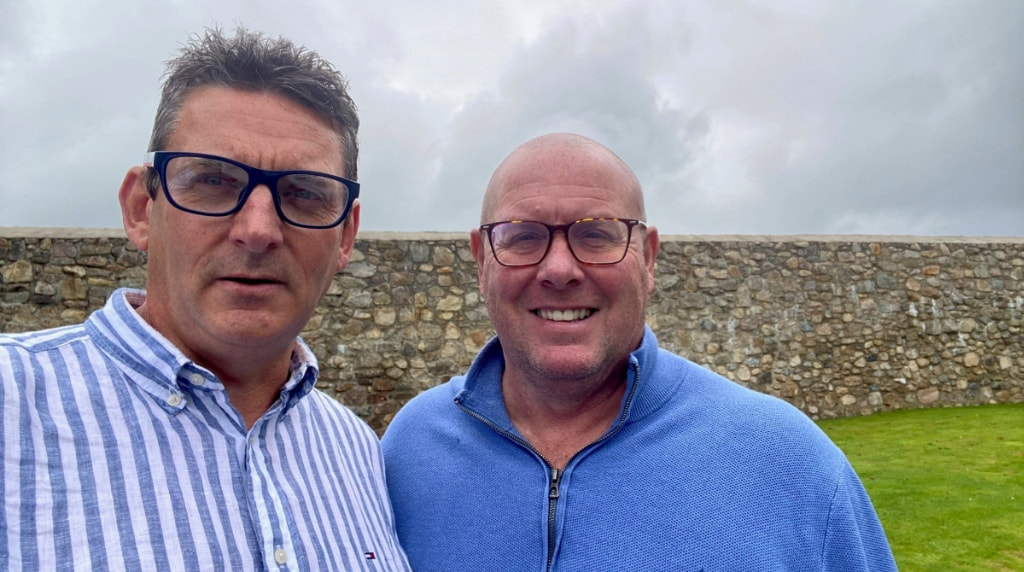Nick Leeson Interview: Betting Needs to Learn Financial Lessons
The UK’s licensed betting sites are under immense pressure. ‘Anti Money Laundering’ and ‘Know Your Customer’ regulations have put them on the ropes. In a fascinating interview, Nick ‘Rogue Trader’ Leeson, once described as the world’s biggest gambler, tells Roy Brindley why he believes the gambling industry must learn from the financial services industry before it lands on the canvas.

Nick Leeson (right) does not like to look back, but he tells Roy Brindley it is the future’s best form guide. ©iGaming
The Big Interview: Nick Leeson
The gambling industry is taking its lead, in regards to KYC (Know Your Customer) and AML (Anti Money Laundering), from the financial services industry. The problem is that the sector is still learning, and it is proving to be a costly education!
That is the belief Nick Leeson, the famous ‘Rogue Trader’, who, while continuing to be an in-demand after-dinner, conference, and keynote speaker, now works as a consultant for businesses in relation to risk and corporate responsibility.
As a man who secretly lost £827 million while based in Singapore and working for Barings Bank as a derivatives trader (seeking arbitrage opportunities between Japan’s Nikkei 225 and Singapore’s SIMEX markets), few people are better qualified to conduct private investigations into cases of financial misconduct.
Given he created a black hole that represented twice the available trading capital of Barings Bank, Leeson’s unauthorised activities were incredible. Its inevitable February 1995 collapse was swift and incurred the loss of a further £100 million.
Two Decades of Rogue Acts
Remarkably, financial institutions never learned from Barings’ mistakes. In the two decades following Nick Leeson’s significant misdemeanour, several other ‘traders’ bypassed their employers’ internal controls and risk limits to disguise catastrophic losses.
In 2008, Frenchman Jérôme Kerviel concealed $6.9 billion in losses from his company, Société Générale. Like Leeson, Kerviel is not thought to have profited personally from his unauthorised positions, which he could carry out thanks to his intimate knowledge of the bank’s computer systems.
In similar circumstances, Kweku Adoboli, a trader for the Swiss investment bank UBS in London, committed what the City of London Police described as “The UK’s biggest fraud, committed by one of the most sophisticated fraudsters.” He had secretly gambled away $2.3 billion before his 2011 arrest.
Alexis Stenfors, a former senior trader at Merrill Lynch in London, also disguised his activities, forcing the US bank to make a $456 million write-down in 2010. Ultimately, the list is as broad as it is wide, and there are many more cases of exposed Rogue Traders.
However, the number of cases brought to light has dried to a trickle. It suggests financial institutions finally have the measures in place to ensure individuals can no longer disguise unauthorised activity while chasing profits or, for the most part, chase losses.
Fraud Prevention and Regulation Adds Up
As I was about to discover during my sit-down with Nick Leeson, this crime clampdown has been and remains a costly exercise. Fraud prevention and the occasional failure of customer fraud detection now cost organisations mind-blowing amounts of money.
The original Rogue Trader may be ‘financials centric’ – notwithstanding that in 2000 he was the person chosen to launch the PaddyPower online betting site with the fledgling company describing him as “the world’s biggest gambler” – but Nick Leeson’s experiences should serve as a cautionary tale for the UK’s licensed betting sites.
Suffice it to say that different regulators police the financial and betting industries. UK betting is controlled by the Gambling Commission (UKGC). The Financial Conduct Authority (FCA) regulates financial services firms with a brief to protect consumers, ensure market integrity and promote competition.
The two organisations may not mirror one another but there are clear similarities and occasionally an operator will need a licence from both regulators.
A case in point is Spreadex. Some sports bets placed with the St Albans-based company, spread bets, are authorised and regulated by the FCA. The company’s fixed odds and real money online casino offering come under the UKGC’s watch.
During the past few years, the UKGC has slapped Spreadex with two significant fines for anti-money laundering and social responsibility failings.
Listing Losers Helps to Take Account
Nick, in your personal opinion, is financial trading gambling or something different?
“Gambling, no question. Just take a look at Pepperstone [a platform for trading CFDs (contracts for difference), Forex (foreign exchange market), commodities, and cryptocurrencies], at the very top of their homepage, what does it say? It says 75.1% of retail investor accounts lose money when trading CFDs with this provider.”
“If that’s not the dictionary definition of gambling, what is? There is no difference between the two, although brokers are not bookmakers. As with betting exchanges in gambling, they facilitate trades between people. It’s still gambling – speculation where you can lose.”
“Due to market volatility caused by Mr Trump’s unpredictable moves, sites like this are doing more business than ever. In fact, this firm recently took to social media to celebrate that they did one million trades in a single day for the first time ever.”
“One million. As we recently discussed on my Rogue Trader podcast, that’s 750,000 losing trades! I mean, it’s great to celebrate quietly, but do it discreetly because, with that volatility, there’s a lot of blood on the floor – mainly belonging to retail customers who have done their brains!”
“Do you need further proof that people like to gamble? While playing in the markets is considered more noble and legitimate than sports betting, it’s all gambling. We are all speculating on an outcome,” he states while I try to digest the 75% figure.
I ponder what would happen to the industry if UK-licensed online betting sites were forced into divulging such information (by the UKGC) on their home page.
I suspect the displayed figure would be closer to 97% with the remaining 3% of accounts either closed by the operator or restricted to bet sizes in pennies instead of pounds!
The UK’s Gambling Industry Painting it Black
Keen to get his outsider’s view on the UK’s betting industry’s current predicament, I gave Nick a list of hot-potato topics starting with the UK Government’s proposed consolidation of the current three-tier tax system for remote gambling into a single Remote Betting & Gaming Duty.
Horseracing, countering with an Axe The Tax campaign, believes this will cause it to suffer a revenue loss of £40-90 million annually and create an exodus of punters and players headed to unregulated and unlicensed sites, otherwise known as the ‘black market’.
Since 2020, the UKGC has enforced some of the world’s most comprehensive KYC (Know Your Customer) standards. Beyond account verification, licensed operators must conduct ongoing monitoring for suspicious behaviour.
Another licensing requirement, under the guise of AML (Anti Money Laundering), means that when certain limits and thresholds are reached, customers are subject to affordability checks whereby they must provide betting sites with proof of their source of funds or source of wealth.
Figures are vague, but intrusive requests for bank statements and payslips are believed to have resulted in an inflation-adjusted 25% drop in betting turnover during the past three years. An October 2024 study stated that the number of global banks losing clients due to slow and inefficient KYC onboarding practices had surged.
It is Nick’s turn to digest some sobering facts and figures. I cloud the issue further by explaining that the global online gambling market is growing steadily in size and user base. It is soon predicted to surpass $100 billion and reach $153.57 billion by 2030.
Big Business Means Big Fines
How does the betting and financial services industry compare in the current climate?
“That’s a lot of business. I suppose the main difference is the fines are a lot bigger. I mean, JP Morgan – which is one of the biggest American banks – I’d say that they pay at least $200 million a year in fines regularly for money laundering, fraud, and other mis-selling types of situations.”
In the UK, the failure to implement robust KYC and AML processes has resulted in hefty betting industry fines. In 2022, Entain, the owner of Ladbrokes and Coral, was slapped with a £17 million fine for AML failings. William Hill went a few million better with a £19.2 million penalty the following year.
Beforehand, VIP failings, AML, and social responsibility issues saw Betway fined £11.6 million in 2020, and 888 UK Ltd took a £9.4 million hit in 2022. More recently 32Red Limited and Platinum Gaming Limited, both part of Kindred Group plc, were handed a £7.1 million penalty.
How do companies under both codes feel about regulator fines?
“The unfortunate part is, it is a function of doing business. The costs to the gambling industry, fines, and staffing will rapidly rise. It will follow the finance industry’s lead.”
As we paused to pour more tea during our breakfast meeting, I mischievously asked Leeson what he thought when he first heard there was an online gambling company called 888. The error account he used to disguise his losses at Barings was called the 88888 account!
Seeing the funny side of the question, he quips, “I thought, I need to get an account with them!” But, in all seriousness, Nick says he rarely places a bet and if he does, his stakes are “a tenner on a rugby match or a similar bet during a day at the races, that’s it. I still play the markets.”
A Huge Cost to the Gaming Industry
In addition to enormous fines, what other costs are involved with modern day trading?
“When I worked at Barings, one person worked in compliance. Walk into JP Morgan or Citibank in the City of London now, and 5,000 people work in compliance in each.”
“You know I had a random conversation with a guy the other day that used to work for SG Warburg (a former FTSE-100 listed London-based stockbroker) who told me there was a picture of me on the wall when he started with the company.”
“After a few weeks, he asked, why is there a picture of Nick Leeson on the wall? He was instructed to call me Saint Nick. But why, he protested? Because this is the Risk Management and Compliance Department, and without him, none of us would have a job here!”
“Anyway, nowadays, in order to do all the AML and the fraud controls that are needed to safeguard you against that sort of stuff, it’s going to cost you an awful lot of money. I’m sure these types of costs will soon stack up to the point they are squeezing the gambling industry’s profits down to crumbs.”
“You see, you end up dealing with so many false positives that a lot of those 5,000 people, risk managers and compliance officers, who all earn more than a hundred grand a year, they are not cheap, are wasting their time because what they are investigating is just a false positive.”
“It’s something that comes up on the system, which says there is a potential issue, and when they investigate it, it’s no longer a red flag.”
“It could be anything from several quick deposits and withdrawals to uncharacteristic enormous trades, or bets, that can win or lose minute fractions and be closed in seconds – these can be identified as washed money by a system.”
“Beefing it up, I’m all for that. Source of funds? It’s another key thing in the financial services industry these days. I think the potential cost of that to the gaming industry is huge, but what they’ll do is ramp up the fines as well, because the fines effectively pay for the regulator.”
Few people will ever lose as much gambling as Nick Leeson. pic.twitter.com/r6XwBYT2iL
— Sports & Betting History by BestBettingSites (@BettingSitesCom) May 4, 2024
Is UK Offshore an Option?
It is widely believed punters need to brace themselves for a poorer deal as betting sites will increase margins to cover spiralling costs. The fear is current customers of UK licensed online betting sites will take their business to sites that are not stringently regulated. What are your thoughts on this, Nick?
“Punters will leave, without a doubt. It is only right to go where the value is, to shop around for the best deal, the best prices. And there are similarities with CFD markets, where going offshore means ESMA (European Securities and Markets Authority) regulations can be circumvented.”
“Larnaca, in Cyprus, is the hot spot. It’s a mini-Dubai, it’s where all the CFD players are. To explain its popularity, as a UK account holder with a UK broker, your maximum leverage is 30% on a trade. If you can open an account with a Cypriot broker, your leverage can go up to 300%!”
“The issue is, and I don’t know if this will apply, but if a UK-licensed broker onboards you as a UK-based customer to another part of its business, such as an offshore subsidiary, to benefit themselves and seemingly yourself, they will be in fierce trouble. We are talking jail time for directors. Can or will UK betting companies divert people without this threat, he asks?”
For a short time in 2001, before betting tax was abolished, online customers of the major UK betting firms could visit their bookmaker’s .co.uk website and then click through to the company’s .com entity (which could not be legally advertised).
From this point onwards, tax-free bets could be placed via the offshore servers based in Gibraltar belonging to companies such as Ladbrokes. So, Leeson’s is asking a theoretically interesting question.
“The more it [online gambling] gets like the financial services industry, the controls will get an awful lot tougher, “ says Leeson. “They [UK betting sites] have a benchmark, which is the financial services industry, that they can work against to see what’s worked and hasn’t worked.”
Winners, Losers and Blind Eye Profits
I’ve caught Leeson at an interesting time. He had addressed the Crisis Management Team of Barclays Bank in Canary Wharf, London, two weeks beforehand. Two days later, it was announced that the organisation had been fined £42 million by the Financial Conduct Authority (FCA) for failings in its money laundering risk management.
Forty-eight hours after our sit-down, the 58-year-old was due in Estonia for a celebrity gathering at the luxurious Bombay Club Casino in Tallinn as a guest of its owner, Australian Tim Heath. A verified billionaire, Heath made his fortune through the leading crypto‑gambling platforms Bitcasino.io and Sportsbet.io.
Our conversation develops rapidly, and his trip to the Baltics reminds me of the €8.4 million fine the Lithuanian gaming regulator recently imposed on Olympic Casino Group Baltija. It was determined that the offending company failed to investigate the source of a customer’s funds and did not report suspicious transactions, violating AML laws.
The customer was Sarunas Stepukonis, a former partner at BaltCap, the Baltic region’s largest private equity firm. He is accused of embezzling €42 million from his company, of which €38 million was gambled away at land-based and online casinos!
Why are risk, fraud and money laundering cases still slipping through the net?
“Blind eyes are turned when profits are involved, so I am not surprised by these cases. You know, and I know that the person that the bookies, casinos and financial players love is the chaser. Somebody who has lost their money and chases losses while losing touch with the gravity of their situation.”
“I have a case with IG Group where somebody, a retail customer, managed to run up losses of £250,000 over six years without ever once being asked for a bank statement or proof or source of funds. If they had asked the right questions, they would have seen that he was borrowing most of the money on payday loans.”
Strict Limits Would Create Mass Migration
If the UK implements stricter measures like £100 monthly loss limits, what percentage of the existing player base would he predict would migrate to unregulated crypto casinos and sports betting sites within 12 months?
“After reading your recent State of Gambling survey, I’d say far more than 30 per cent,” Nick replies. “People who want to gamble will always find a way. A potentially dodgy operator? That’s just a small risk in the mind of someone placing a bet on the outcome of the turn of a card when playing online Blackjack.”
“At the end of the day, human nature dictates that people will always throw a degree of caution to the wind when money is involved. Look at me in the summer of 1994 when I returned from Singapore to the UK for a week’s holiday.”
“Rather than using the time to investigate exactly what was going on in my office and where the profits were coming from, in fear they would not make any money when I was away, Barings had me working overnight in 8 Bishopsgate (Barings London office) with the cleaner hoovering around my feet.”
We Do Not Know if AI Is the Answer
So, what is going to be the next black swan event, Nick? A massive data breach, a sudden regulatory collapse in a key market, another Rogue Trader?
“I do have a fear over the AI side of things. It is being embraced, and I am not sure about too much easy integration of AI into everything that we do.”
“Looking back over the years and thinking about the financial markets, Société Générale were, in my day, the cutting edge of the financial markets. They were doing the cleverest stuff. They were ahead of the curve on everything you could do with complex derivatives.”
“Four or five years later, they had their own rogue trading episode, and bang, they lost $6.9 billion with Jérôme Kerviel leading them off a cliff edge.”
“JP Morgan used to employ some of the best people, the cleverest people in the world, and they used to have a fund called the JP Morgan Alpha Fund. It was supposed to have limited sensitivity to market swings. It was Rolls-Royce stuff.”
“The people behind it looked at risks, and the impact of standard deviations, questioning what happens if there is an event that causes one standard deviation or two standard deviations away from the norm. This was all worked into calculations.”
“Then there was this massive event, it might have been the dot-com crisis when that bubble burst. Guess what? It proved very soon afterwards that the way they were risk managing the fund, well, it just didn’t work, the model didn’t add up.”
“My worry is that AI could send you down a rabbit hole because it could also, more so, be considered equally brilliant or infallible, the perfect model. Until an event, a crisis, happens, we won’t know how good or dependable AI is.”
“Everyone seems so pro AI; it’s gonna do this, it’s going to do that, it’s the best thing since sliced bread. Is it really? For me, AI still needs checks, processes and controls. Putting too much faith in it could be extremely dangerous.”
Big Brother Star on Meeting Inspirational Men
Our chat deviates again. Nick was a contestant in one of the most controversial series of Celebrity Big Brother, Celebrity Weakest Link, The Irish Celebrity Apprentice and other such reality gameshows.
Are there any more reality TV type shows on the horizon for you? I mean, I’ve not seen you on Dancing On Ice or Master Chef, I enquire.
“Well, I like a challenge, but I cannot dance, and I cannot cook,” he replies. “Great, I’ll lay you to lose on a betting exchange for those,” I boast in retort. “No, you won’t, that would represent insider trading, and that’s illegal,” he says with a wry smile.
Those TV appearances plus trips around the globe telling his tale alongside other keynote speakers on major stages must have led Leeson to meet some fascinating people.
Who is the most famous person you have met during your post-Barings journey?
“I did an event in Harrogate once where Mikhail Gorbachev spoke, as did Murray Walker. It was great meeting them. Sadly, Gorbachev only spoke in Russian, so the conversation was not great. But I try to keep myself to myself and do not get too carried away with ‘celebrity’.”
“I suppose the person who left the greatest impression was Aaron Ralston; we did a few events in Sweden together. He is the guy who snapped and cut off his own arm when trapped, isolated and facing certain death in a canyon in Utah.”
“His tale was amazing, uplifting and powerful. It left some people in the audience in tears. Others fainted and needed medical attention. His is a great story, powerfully delivered.”
Dealing with the Reality of the Situation
Thirty years have passed since Barings collapsed, an event that, for several days, made Nick Leeson the most famous person in the world.
The Nick Leeson of today must be a very different person from the one he was decades ago. Would you change much?
“I’d love to think none of it happened, but it did, so you have to deal with the reality of the situation. You are the sum of your experiences, so I look back on the last 25 years, since I was released from prison, only with pleasure.”
“I wouldn’t change it, I wish it [the Barings crime] never happened, but that’s not an option. Prison taught me one thing and one thing only: There are things in life you can influence and there are things in life that you can’t influence.”
“Just focus on the things that you can influence. Nobody more than me wishes it never happened, but it did, and it cannot be changed.”
 Our Favourite New Slots and Where to Play Them in March 2026
Our Favourite New Slots and Where to Play Them in March 2026
 New Online Casino Games Coming Out in 2026
New Online Casino Games Coming Out in 2026
 Valentine’s Day Online Slot Games
Valentine’s Day Online Slot Games
 The Top 5 New Online Slots in January 2026
The Top 5 New Online Slots in January 2026